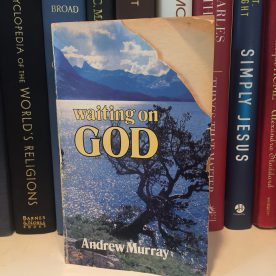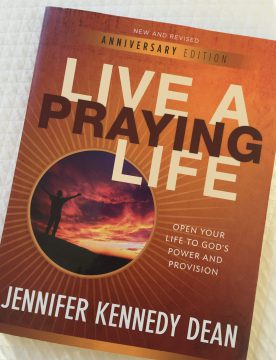Do you trust me?
That’s a question God’s asked me, again and again, when my prayers don’t get answered in the way, or the timing, I want.
Or when I can’t see what he’s up to.
Or when I think I’ve got God all figured out—his plans for my children, my schedule, the desires of my heart—but it turns out that I actually don’t.
And when a friend (let’s call her Grace) told me what happened with her nephew and his back-to-back birthdays, I saw myself in the story. Maybe you’ll see yourself too.
A good and perfect birthday gift
What do you give a little boy for his birthday?
Thinking an airplane might elicit some smiles, Grace wrapped up a model flyer, the styrofoam kind, and gave it to her nephew. Sure enough, the boy LOVED the gift—and promptly launched it over the neighbor’s privacy fence, where the plane crashed upon landing, never to be played with again.
The following year, Grace tried again. And when she called to wish the child a happy birthday, she learned that the second present had not yet been opened.
“I know you got him another airplane,” Grace’s sister explained, eyeing the long gift-wrapped box, “and he will be so happy. But it’s pouring down rain and he can’t go outside, so we’ll open your present tomorrow.”
Grace burst out laughing. The gift wasn’t an airplane. It was an umbrella. Perfect for jumping in puddles and playing outside on a rainy birthday!

God knows what you need
I don’t know about you, but I’ve lost count of the times when I’ve thought that God had an airplane for me (or for my child), but it turned out to be an umbrella—and once I stopped questioning or complaining, I recognized the goodness and perfection of his gift. And if I lost you somewhere in that sentence, here’s what I’m trying to say:
God rarely repeats himself. (See Isaiah 43:19.) When we spend our time looking back at last year’s presents, thinking we know what God has in store for us next, we risk missing the new thing. We risk missing God’s perfect provision for now.
God’s ways are not our ways. (Isaiah 55:8-9) We can trust that his thoughts, and his plans, are higher (and better) than ours.
God knows what we need, even before we ask him. (That’s Matthew 6:8.) We might sit there blathering on and on about how much we love airplanes, but God knows when it’s going to rain. He wants us to be ready. He wants to give us what we need—and what he already knows we will also want.

Trust with all your heart
So where does that leave us when we know God is good and that he’s got a plan, but we don’t understand (or like) what he seems to be doing? What do we with the gap between notion of what we think we need and the reality of what God provides?
We trust.
Proverbs 3:5-6 says, “Trust in the Lord with all your heart and lean not on your own understanding; in all your ways submit to him, and he will make your paths straight.”
(Or, as the Message puts it for mule-headed people like me: “Don’t try to figure everything out on your own.”)
If trusting God in the face of uncertainty or disappointment feels iffy, or even impossible in times of grieving or loss, that’s okay. Just like we don’t have to create faith on our own (think about the father in Mark 9 who asked Jesus to help his unbelief), we don’t have to position ourselves in a posture of trust. We can ask the Holy Spirit for help.
We can turn Proverbs 3:5 into a prayer (and if you follow me on Instagram or Facebook, you may have seen this one in my stories today):

Help me trust in you with all my heart instead of leaning on my own understanding. (Proverbs 3:5)
When we come before God in surrender, he will make our paths straight. And as we lay our requests before him, we can do so knowing (as Tim Keller puts it) that “God will either give us what we ask or give us what we would have asked if we knew everything he knows.”
We can unwrap the umbrella, thank God for his provision, and go out and dance in the rain.
❤️
P.S. Trusting God is an area where I often struggle, particularly when I am *sure* that my idea, my way, or my timetable is better than his. If that’s where you find yourself too, here’s a little bonus material to chew on today.
For further reflection…
Read Psalm 84:11-12. What does God promise in these verses? What do you think it means to walk “blamelessly”? (Hint: See Colossians 1:21-22.) How does verse 12, coming so close on the heels of verse 11, shape your understanding of what God promises us?
Read Isaiah 26:3-4. What does God say he will do when we trust him? How does the image of God as the “Rock eternal” encourage or embolden you?
Finally, allow the words of Romans 15:13 seep into your soul as you turn this verse into a prayer:
Heavenly Father, God of hope:
Fill me with all joy and peace as I trust in you, so that I may overflow with hope by the power of your Holy Spirit.
Amen


















